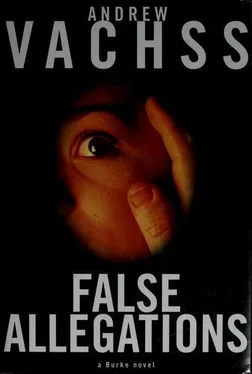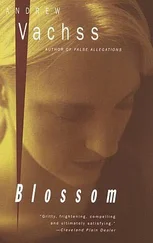"I need the phone," I told the kid.
He just nodded his head, acknowledging the respect I paid him by asking.
I went down the carved–earth steps to the bunker, moving past the machinery, the microscopes, the computers until I got to the phone. It was a blue–box loop job—the signal went into the 800 circuit and came back up, ready to dial, impossible to trace. I didn't know how it worked, but I knew it did. I lit a cigarette, thinking. The Mole tried to explain the filtration system he had set up down there once. I never understood that one either, but it worked perfect. The Mole put it together so he wouldn't kill himself with the fumes from his experiments—the bunker always smelled like an operating theater.
I held Kite's business card in my hand. Noticed for the first time that it flickered in the light. I turned it slightly, looking close. Some kind of pattern punched into the vellum—blind embossing, they call it, kind of like braille. I traced it with my fingers. Something was under the engraving, but I couldn't bring it up. I tried one of the Mole's examining lamps for a couple of minutes before I saw it: a kid's kite, slightly puffed out against the lifting breeze, a long tail dangling.
The number was a Manhattan exchange. Easy to tell now—all the other boroughs are 718. I tapped it out on the keypad, listening to the long series of beeps as the signal went out and looped back around. Then it started to ring. Once, twice, three times, then…
"Good morning," a woman's rich, husky voice.
"I'd like to speak to Kite," I said, my own voice as neutral as a heart monitor.
"May I tell Mr. Kite who's calling?"
"Burke."
"Could you hold just a minute, please?"
She didn't wait for a response before switching the line to hold.
"Thank you for calling," a man said suddenly. His voice was thin but strong. Titanium wire.
"What do you want?" I asked him, done with the ceremony.
"To talk. Face to face. I have an offer to make. For your services. Your professional services. The offer is complicated. I wouldn't feel comfortable making it on the phone."
"I'm retired," I told him.
"Yes," he replied, like he knew what I meant and it made sense to him. "But not retired from listening , I'm sure. That's all I want, for you to listen. I know your time is valuable. And I'm prepared to compensate you for any inconvenience involved. But I did go to considerable trouble—"
"That wasn't neces—"
"Actually, I believe it was, Mr. Burke. And I'm prepared to go to much more trouble if I must. May I have the opportunity to explain?"
It was a perfect threat, skillfully delivered. He could find me if he had to…and he sure as hell knew where to look.
And he knew about Michelle.
"Sure," I said, like he was being too reasonable to refuse. "How do you want to do it?"
"Completely at your convenience, as I said. I can come to you, you can come here…whatever you say."
Telling me he knew where to find me? Mama's? The building where I live with Pansy? Max's dojo?
"I'll come to you," I told him.
"Would tomorrow be acceptable?" he asked. "Anytime after three…?"
"Four."
"Four it is. I appreciate this very much, Mr. Burke. I look forward to seeing you then."
He gave me the address and hung up.
For some reason I didn't quite understand but still trusted—maybe some tiny tug at the tip of the hyper–vigilance that comes standard with all Children of the Secret—I shaved real close the next morning. Then I combed some of that stupid gel Michelle got for me through my hair. Put on an undertaker–black worsted suit over a cobalt silk shirt with a plain black silk tie. I stepped into a pair of soft black alligator boots with steel toes and hollow heels. One heel held ten hundred–dollar bills wrapped around a handcuff speed key; the other a little round box like women keep lip gloss in. If you pulled the tab off the top and waited about five seconds, it would blow a door off its hinges. I fitted a smuggler's necklace around my neck under the shirt. Twenty–four one–ounce ingots of pure gold—you could pop them out one at a time, bribe your way free of damn near anything.
A complete set of ID went into my wallet. Not the Juan Rodriguez stuff I used for my license and registration—I wouldn't be taking the Plymouth. Arnold Haines was up to date on all his credit cards. He appeared on a few visiting lists in a couple of Upstate prisons, but, hell, a lot of legit businessmen were on those lists.
I never thought about taking a gun. But under the bead capping the tang to my belt buckle was an alloy needle tipped with a dab of paste the Mole gave me—a little present from one of his pals in the Mossad. And the gold coin I used for a money clip had a half–moon razor I could push out with a thumb without looking.
Pansy watched me suspiciously, somehow knowing she wasn't coming along. "When I come back, I'll bring you something special," I promised her. "No Chinese this time, okay?"
She made her snarfling noise, ice water eyes regarding me with all the mercy of a polygraph. "I promise , okay?" I said, patting her massive head, scratching behind her ears until she shifted to a purring sound, trusting me again.
I wish it was always that easy.
"Oh be careful with it, mahn. Please , now. This is not a damn lorry you are driving, all right?"
Max shifted the Rover into second gear as carefully as a surgeon removing a cataract—his huge hand looked like a scarred piece of old leather on the floor knob. His eyes flicked at me in the mirror, asking for sympathy for Clarence's mother–hen attitude. The West Indian hawk–eyed the Mongolian's every move, as nervous as I'd ever seen him.
"He insisted on driving, mahn," he told me. "And you know how delicate my ride is."
"So why'd you let him?" I asked.
"Ah, he is my brother," Clarence said. "And he wanted to so badly…"
For some reason I never quite got, Max loved to drive. He wasn't real good at it, especially in the city. It was like he expected cars to step aside for him the same way people did. He'd banged the Plymouth up more than once. But he was handling the Rover like it was a fragile child, keeping a nice cushion of air around him as we wove through the narrow streets of Chinatown. It was just past two in the afternoon—plenty of time to get to the midtown address Kite had given me.
"It'll be okay," I assured Clarence. "Max knows you love your car."
A truck blocked the cobblestoned street ahead of us. One–way street, traffic behind us. There was almost room enough to get past. Max inched the Rover forward. Clarence clasped his hands in prayer. A parked car on our right, the outside rearview mirror of the truck to our left. We were only about four inches short of slipping by, but that still left us wedged in—no place to go.
I signaled Max to stay put and climbed out of the back seat. Three guys were sitting on a loading platform, drinking something out of big white styrofoam cups.
"That your truck?" I asked them.
"Who wants to know?" the guy in the middle asked back, chin up, neck muscles starting to tighten.
"You're blocking the road, pal," I told him. "Just pull over a few inches and we can get by."
"In a minute," he said, dismissing me. The guy on his right nodded approval.
Asshole. I got back in the car, lit a cigarette. Max rapped the dashboard. I leaned forward, caught his eyes. Put my inside wrists together, clapped my hands, making a "yap yap" gesture. I tapped my watch, held up my hand, fingers spread. Meaning: another five minutes, they'll get tired of the game and move the truck—no big deal. Max started to get out of the car. I held my palm out like a traffic cop. No—it wasn't worth it.
Читать дальше











